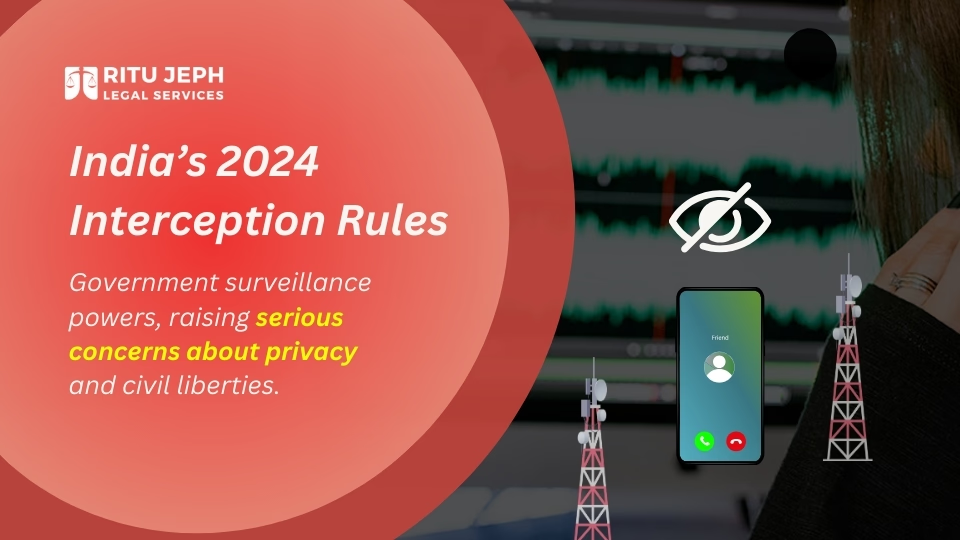Book Appointment Now

How India’s 2024 Telecommunications Interception Rules Threaten Privacy
India's 2024 Telecommunications Interception Rules expand government surveillance powers, threatening privacy and free speech. Learn how these new rules impact digital privacy and the need for stronger oversight in India.
India’s 2024 Telecommunications Interception Rules have reignited the debate over government surveillance and privacy in the digital age. While the government argues these rules are necessary to protect national security, critics warn that they may violate privacy rights and free speech. In this article, we’ll explore how these new rules affect citizens, compare them to past regulations, and assess whether they strike the right balance between security and individual freedom.
The 2007 Rules and Privacy Safeguards
Before we dive into the new 2024 Telecommunications Interception Rules, it’s important to understand their predecessor: the Indian Telegraph (Amendment) Rules of 2007. These rules outlined procedures for lawful interception of communications, with key safeguards designed to protect privacy. For example, telecom companies were held accountable for unauthorized interceptions and faced penalties for violations.
The 2007 Rules made it clear that service providers were responsible for ensuring that citizens’ privacy was protected. They included provisions requiring companies to implement internal checks and safeguard communication data from unauthorized access. If a violation occurred, the companies were penalized, creating a system of accountability.
ALSO READ: How the Kolkata Tragedy Highlights the Need for Women’s Safety at the Workplace
However, these rules had their limitations. The broad grounds for interception, such as national security or public order, left room for potential misuse, and critics pointed out that oversight mechanisms were insufficient.
The 2024 Rules: An Expansion of Government Surveillance
The new Telecommunications Interception Rules, introduced in 2024, build on the framework established in 2007 but represent a significant expansion of government surveillance powers. The 2024 Rules cover not only traditional telecommunication services but also digital communications, meaning that the government now has the power to intercept almost any form of electronic communication, from emails to encrypted messaging apps.
One of the major concerns about these rules is the vague language used to justify surveillance. Terms like “public order” or “friendly relations with foreign states” are broad and open to interpretation. This gives the government wide latitude to monitor citizens, potentially leading to abuse.
Furthermore, the 2024 Telecommunications Interception Rules do not require judicial oversight before intercepting communications. In many other democratic countries, such as the United States and the United Kingdom, government interception of private communications requires prior approval from a judge. This ensures that surveillance is used only when necessary and that individual rights are protected. The absence of such oversight in India’s new rules raises serious concerns about unchecked government power.
The Impact on Privacy and Free Speech
The expanded scope of the 2024 Telecommunications Interception Rules could have a chilling effect on both privacy and free speech in India. With the knowledge that the government can intercept any digital communication, citizens may become more cautious about what they say, even in private conversations. This could lead to widespread self-censorship, with people avoiding discussions of sensitive topics out of fear that their messages may be intercepted.
Journalists, activists, and whistleblowers, who rely on confidential communications to expose wrongdoing, may be particularly affected. If sources feel that their conversations are not secure, they may hesitate to share important information, limiting the media’s ability to hold those in power accountable.
Moreover, the lack of corporate accountability in the 2024 Rules removes another layer of protection for citizens. Under the 2007 Rules, telecom companies were required to implement safeguards to protect communications from unauthorized access. But in the 2024 framework, these corporate safeguards have been removed, leaving citizens’ data more vulnerable to misuse.
National Security vs. Civil Liberties: A False Dichotomy?
Supporters of the 2024 Telecommunications Interception Rules argue that the government needs broad surveillance powers to protect national security. However, history has shown that unchecked surveillance can often lead to abuse. For example, in the United States, the Patriot Act led to widespread surveillance of citizens without significant gains in public safety. Similarly, China’s vast surveillance network has been used to suppress dissent and control its population.
India’s new rules run the risk of following a similar path, where the government’s expansive powers could be used not just to protect national security but also to stifle political opposition and control public discourse. The lack of judicial oversight and the removal of corporate accountability only exacerbate these concerns.
ALSO READ: Legal Challenges of Non-Disclosure Agreements and Whistleblowing in AI and Corporate Governance
The Importance of Oversight and Accountability
For India to balance national security with privacy rights, there must be robust checks and balances in place. One crucial step is to require prior judicial approval before any communication can be intercepted. This would ensure that surveillance is used only when absolutely necessary and that it does not infringe on citizens’ rights.
Additionally, there must be transparency and accountability in how these interception powers are used. Regular reports should be made available to the public, and there should be independent oversight to ensure that the government is not abusing its powers. Without these safeguards, the 2024 Telecommunications Interception Rules could undermine the very values they claim to protect.
Conclusion: Navigating Privacy in the Digital Age
India’s 2024 Telecommunications Interception Rules have far-reaching implications for privacy and civil liberties. While the government argues that these rules are necessary for national security, they also open the door to widespread surveillance without sufficient oversight. The lack of judicial approval, combined with the removal of corporate safeguards, leaves citizens vulnerable to potential abuse.
For India to truly navigate the digital age while protecting its democratic values, it must ensure that any surveillance framework includes strong checks and balances. This will prevent the misuse of government powers and protect the privacy and free speech that are the cornerstones of a democratic society.



